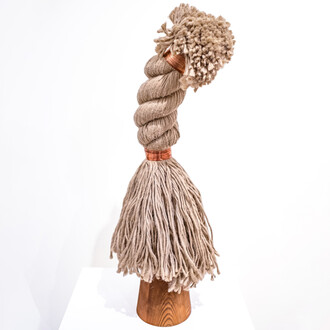I dedicate this work to the U.S.A., that it become just another part of the world, no more, no less
(John Cage, Prelude, Lecture on the Weather, 1975)
In the lead-up to America’s presidential election, Frith Street Gallery and the John Cage Trust join to present a unique iteration of a still prescient work by the seminal American composer, artist, and writer, John Cage. Lecture on the Weather (1975) was originally conceived as a work for either radio or the stage, as a commission from the Canadian Broadcasting Corporation to mark the Bicentennial of the USA. It will be presented at Frith Street Gallery in a new installation based on materials captured at an important 2007 performance at Bard College in upstate New York, featuring an extraordinary cast, including Merce Cunningham, Jasper Johns, Leon Botstein, John Ralston Saul, and others. Theirs was a tour de force realization of a masterpiece, now presented for the first time in Europe.
John Cage was devoted to Henry David Thoreau, and, like Ralph Waldo Emerson, believed there to be ‘no truer American.’ For Lecture on the Weather, Cage drew excerpts from Thoreau’s classic texts, which he then cast into a score using I Ching-derived chance operations; additionally, each score was intermittently graced with chance-determined fragments of Thoreau’s nature drawings, which were to be interpreted as music, in the manner of graphic notation. At the start, Cage delivers a softly polemic prelude, and when the readings and musical realizations commence, so also begins a slowly escalating weather soundscape created by Maryanne Amacher. The work culminates with a film by Luis Frangella: Thoreau’s elemental nature drawings, now stark white on black, simulating flashes of lightning on a dark and stormy night. All of the elements — speech, music, film, lighting, and weather — combine to create a stunningly sensorial experience.
Complementing the installation will be a number of Cage’s early prints that also take inspiration from Thoreau. These include works from the series 17 Drawings by Thoreau (1978), Score Without Parts (40 Drawings by Thoreau) (1978), Signals (1978), Changes & Disappearances (1979-82), and Dereau (1982).
This exhibition is curated by the artist Jeremy Millar, who conceived the exhibition Every Day is a Good Day – The Visual Art of John Cage for Hayward Touring (2010-11).
John Cage (September 5, 1912 – August 12, 1992) was an American composer, philosopher, writer, and artist. A pioneer of indeterminacy in music, electroacoustic music, and non-standard use of musical instruments, Cage was one of the leading figures of the post-war avant-garde. Critics have lauded him as one of the most influential American composers of the 20th century. He was also instrumental in the development of modern dance, mostly through his association with choreographer Merce Cunningham. His most enduring composition is the radically tacet 4’33” (1952), a work in three movements during which no sounds are intentionally produced.


![Lecture on the Weather (1975) [Installation view]. Courtesy of Frith Street Gallery](http://media.meer.com/attachments/4ec7a3a690953b6b54a281dfd27e2665fbcea439/store/fill/410/308/cb7de09f7b2e33987bd367c45d9b8e192395b4dc601a512162f71ae9d025/Lecture-on-the-Weather-1975-Installation-view-Courtesy-of-Frith-Street-Gallery.jpg)
![Score Without Parts [(40 Drawings by Thoreau): Twelve Haiku], 1978, Conor hard ground, soft ground etching, drypoint, engraving, sugar lift aquatint, photo etching, Rives BFK paper, 67.4 x 85.9 x 4 cm (framed). Courtesy of Frith Street Gallery](http://media.meer.com/attachments/d7cbe0dfb0e31d715f301740a22e6b2a3227f8ab/store/fill/410/308/2b7b38935b4d4b882dc4cdacf1c03904323dfb49a9dfda723dbf509d9bdd/Score-Without-Parts-40-Drawings-by-Thoreau-Twelve-Haiku-1978-Conor-hard-ground-soft-ground.jpg)
![Lecture on the Weather (1975) [Installation view]. Courtesy of Frith Street Gallery](http://media.meer.com/attachments/fc283d6b41d760144440649145baa44f148f4fc2/store/fill/410/308/ac3e075bef86326fc7b86414c61879aa04320ce4f4767993a7855607e45a/Lecture-on-the-Weather-1975-Installation-view-Courtesy-of-Frith-Street-Gallery.jpg)










